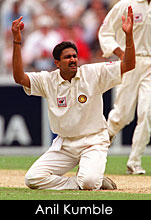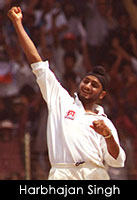The Rediff Interview: Anil Kumble
'We are special, we play with our kind of flair'
Faisal Shariff
Yesterday, in part one of the interview, Anil Kumble spoke of captaincy, of his own approach to the game, his comeback, and related matters. Follows, part two. Read on...
'Vision' is a word we hear from the team a lot, in recent times. What is it all about?
I think it's important for every individual to have a vision, to have an aim. If you don't have an aim, you don't think; if you don't think, you can't achieve.
This is my belief, whether its practice, a match, or whatever -- your mind has to be ticking all the time. As for the team, yes, it needs an overall vision, for the same reason, because it gives us something to work towards. We have had goals in the past, too, short term goals at least, but we haven't always achieved what we aimed for, especially overseas. There are players including myself who have been around for eight, ten years, and one disappointment we all share is the lack of overseas wins.
Which begs the question -- barring Bangladesh, every other Test-playing nation has won at least one Test abroad in recent times, so what is our problem? Is it a mental barrier to be broken, or is there a fundamental problem?
 There is a problem, that much is obvious. I can't put my finger on any one thing and say okay, this is it, this is the reason. I think a lot of it has to do with mental make-up.
There is a problem, that much is obvious. I can't put my finger on any one thing and say okay, this is it, this is the reason. I think a lot of it has to do with mental make-up.
And in a sense, I would think the media has had a role to play, too, in what has happened. Each time we go abroad, or just before we go abroad, the papers are full of stories of how we have never won abroad, stories that run the team down, stories that say we are tigers only at home. We don't find stories saying, okay, this is a good team, it has a chance. We players read these stories too, so don't you think at some level, it will get to us and reinforce whatever mental block we have? This is not an excuse I am making, I am not saying the media is the reason we haven't won abroad, I am the last person to make excuses -- but it is something to think about.
We need to figure out our weaknesses; we need to pin the down, we need to work to eradicate them. At the same time, we need to cultivate the strengths of various individuals, and that is something we have not done before.
We need to change, individually and as a team. But at the same time, we need to do it our way, the Indian way. I need to make one thing clear, the IIndian way of playing cricket is loved around the world. People love to watch an Indian batsman, because he is different from say an Australian one. That is why we are special, we play with our own kind of flair, our own style, and we shouldn't change that. Within that, we need to change, to learn, to adapt to changes in the game, to fine tune our skills -- but not at the expense of changing the way we play the game.
And the good part is that now with John Wright here, that is helping us a lot, he doesn't try to change us, he teaches us what we need to learn.
The other day, when we talked of spinners, you disagreed with my suggestion that we have a talent crisis...
Yes, and I remember telling you that it is like the West Indies, where every second bowler who comes alongg is compared with Malcolm Marshall, Michael Holding, Andy Roberts and so on. Here, every new spinner is compared with Prasanna, Chandrashekhar, Bishen Bedi, Venkatraghavan. We need to realise, first, that there will never be say another Bishen Bedi, that is impossible. Every left arm bowler who comes along, we put pressure on him by telling him to bowl like Bedi. And no bowler can work with that kind of pressure.
Let's forget aboutt the greats of the past. What I am saying is, even today, we have talented bowlers. They may not be Bedi or Prasanna, but that is okay. What we have to do is pick the talented ones, the ones who stand above the rest, and we need, all of us, the players, the media, the fans, to place our confidence in them, back them to perform at the international level.
Performance comes only when there is confidence. And for a player, his confidence increases if he knows his team-mates are confident of him, the media is confident of him, the fans back him. If a promising young bowler comes along and all of us tell him, 'You are not Bishen Bedi, you will never bowl like him, you are not an international bowler', then what can he do?
We need to change our approach. We should identify the talented kids, and we need to point out to them what their strengths are, and help them to build on it. We should also tell them what their weaknesses are, and work with them to overcome it. It is like, when I first started, everyone told me I didn't have a leg break. So what? I had other strengths, but people kept talking of the leg break. If I bowled flighted leg spinners, I would have been somebody else.
Okay, look at it another way -- Australia, to quote one example, has consistently produced great fast bowlers, they have consistently developed new ones to replace the old. We are supposed to be the land of spin, yet we have not managed to do something similar, can you explain that?
Now that is true. And there are lot of reasons for that, which we need to study. You know, when a young 15-year-old bowls here, and he turns the ball a long way, the umpires keep widing him, which is not right because he is actually turning the ball, not bowling it wide. But it happens. And in time, he stops turning the ball, because he can't give away runs through wides. I am not saying this is the reason, I am pointing this out to you to tell you that there are many, many reasons, and we need to examine them all, correct them, and provide conditions where spinners can grow, and be nurtured.
We need to work on our strengths, instead of worrying all the time about what we don't have. And we have to understand that the pressure we apply on players has to be carefully applied, you can't toss the ball to a teenaged kid who has just managed to break into the big time and tell him, okay, come on, here's your chance, take five wickets or we won't pick you for the next Test. No player will be able to perform if he has the shadow of the axe looming on him all the time. If we think a player is talented, we have to pick him, play him, and give him time to grow into his role.
That brings us to Harbhajan -- who came in with enormous pressure, given your absence and the fact that we were playing the world champions. What is it about him that makes him so hot, that makes him stand out?
 He has got zip off the wicket, which is his greatest strength. Again, let us give him confidence, let us give him some time. He is just 20 years old. We keep talking of Bishen Bedi and Prasanna and Chandra -- let us remember that they were not great at 20, they were good at 20 and they became great as they matured. We have Harbhajan now, he is a good bowler, and a great prospect -- it all depends on us, the team, the selectors, even the media and the fans, how we develop and nurture him, it depends on us whether he becomes a great bowler or not.
He has got zip off the wicket, which is his greatest strength. Again, let us give him confidence, let us give him some time. He is just 20 years old. We keep talking of Bishen Bedi and Prasanna and Chandra -- let us remember that they were not great at 20, they were good at 20 and they became great as they matured. We have Harbhajan now, he is a good bowler, and a great prospect -- it all depends on us, the team, the selectors, even the media and the fans, how we develop and nurture him, it depends on us whether he becomes a great bowler or not.
When I meet the younger players, I invariably come away with the impression that the seniors don't have time for them, don't help them. Would you, as a senior player, own up and say yes, I haven't given them as much time as I should have? The younger players say, at the end of the day the seniors go to their rooms, do their own thing...
That may be true. But there is also a vice-versa. It is equally important that the youngster also shows some interest. It is important that you as a youngster also show that you are interested in learning, in improving, it is important that you also express your opinions.
I have never had the attitude that I am a senior and so I won't go up and talk to a younger player. Whenever I have seen someone going wrong, and when I thought I could help, I have gone up and helped. But then, the player should also show that he is willing to listen.
Of course, I must admit that for a youngster, it must be difficult to approach a senior for help. For a long time you've been watching the team on TV and looking up to the seniors, and suddenly you find yourself sharing a dressing room, I guess that must be hard too.
Finally, Anil, a field you specialise in -- software. Cricket used to be a simple game, do we really need all this complicated software in use today?
It is not humanly possible to keep too many things in your mind -- somehow, in the confusion, you end up ignoring or forgetting something important. So when you have someone sitting outside, monitoring things, breaking them all down, spotting weaknesses, it helps. It helps if there is someone who can show you -- not tell you -- why three years ago, you were doing something right and now you are doing it wrong, it helps you learn and correct yourself. We have to keep in mind that software is a tool -- it is not like, you have software so you become a good cricketer, he doesn't have it so he remains bad. What is important is how you use it, what you learn from it. It is not that I am a believer in the value of pure theory -- but at the same time, you have to admit that theory is important too, and you should never ignore that side of your game.
Interviews
Mail Cricket Editor